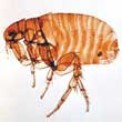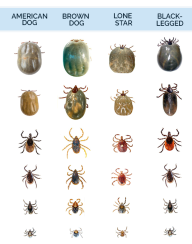Flea & Tick Control
Fleas
Fleas are a pesky parasite that can drive your pet mad with itchiness. However, that's not the only problem fleas cause. Since they feed on blood, they can transmit diseases such as a blood parasite called Mycoplasma felis (previously called Hemobartonella) which causes anemia and severe sickness in cats. In young animals, a high number of fleas can cause anemia. Fleas transmit other infections so they are a health hazard beyond causing itchiness.
Fleas also carry tapeworms. All your pet has to do is eat one flea to get the parasite. Often, tapeworms go undetected. To diagnose tapeworms, you have to see the rice-like segments near the anus or on the stool. You can bring in what you think may be tapeworm segments, and we can identify them for you. We advise all pets that have fleas be treated for tapeworms.
Allergies to fleas can occur at any time and are extremely uncomfortable to your pet. The severe reaction can be caused by just one flea bite. The cat or dog often chews their skin raw, loses hair, loses weight, and can have small scabs throughout their body. These pets usually feel miserable. It's important that they stay on flea prevention year round.
If your pet already has fleas, he or she (and all pets in the house) will need to have at least three consecutive months of flea prevention. This is needed to kill all of the life stages in the environment. We recommend that your pet continue on monthly flea prevention year round.
Ticks
We have four main species of ticks in Illinois: American Dog Tick, Deer Tick, Brown Dog Tick, and Lone Star Tick. Each of these ticks has diseases that they can transmit to your pet. The most commonly thought of disease is Lyme disease, which is transmitted by the Deer Tick. All of these diseases can make your pet very sick.
Because of the severity of these diseases, it is best to prevent the ticks in the first place. We recommend a monthly preventive medicine. Many flea preventive medicines also kill ticks but use caution when determining the best product for your pet. Some only kill one species of tick. If your pet is more likely to be exposed to tick infested areas such as bushes or wooded areas (and this could be your backyard), make sure you pet is protected against all species of ticks.












